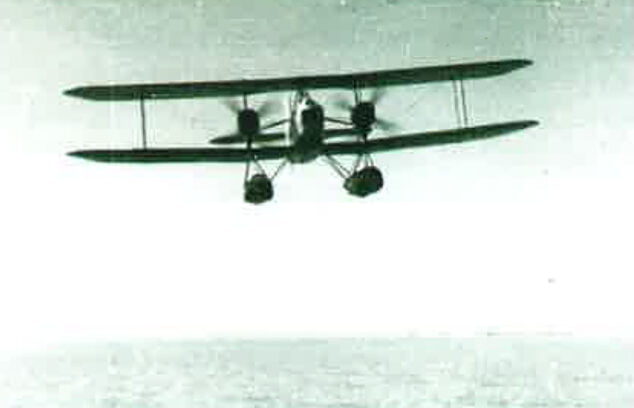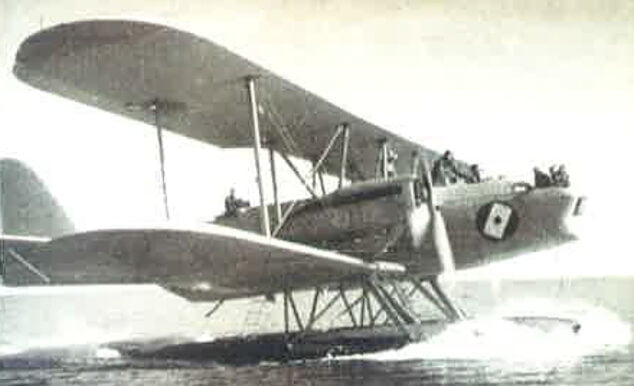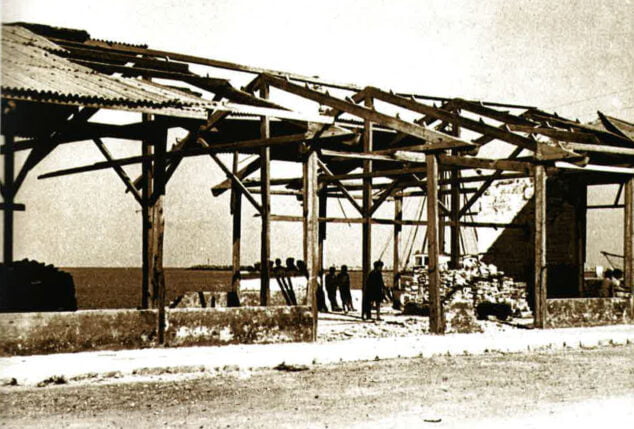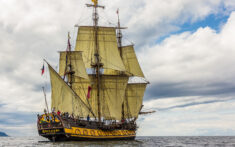The morning of October 18, 1938 Dénia lived the event that would mark the neighbors for generations and that is still remembered today. It was the most devastating and bloody bombardment that took place in the streets of the town.
Since the Civil War, Dénia remained faithful to the Republican side. Its privileged situation in the rear allowed it to live the conflict with relative normality. If it weren't, of course, for the multiple bombings that were lived and the constant sound of mermaids that warned of the presence of German and Italian aviation flying over the municipality.
The siege of the German "zapatones" to Dénia
When the conflict went from being somewhat amateur to professional, at the moment that foreign interests entered to participate in that simulation of what would be the Second World War, Majorca became an airfield that hosted the air troops of Hitler and Mussolini who collaborated with the coup led by franc. In 38, Dénia would especially suffer the presence of the Germans, who had a total of 27 seaplanes Heinkel HE59. These biplanes were what on the street became known as "Slippers" since they had two large skates to splash down. Their dimensions allowed them to carry up to 1.000 kilograms of bombs or even a torpedo. Although they were slow due to their cumbersome construction, very similar to those of the First World War, and heavy, their number of successes, according to the researcher Miguel S. Puchol in cooperative work The Civil War in Dénia, it was huge.
The AS / 88 squad belonged to the Condor Legion and its objective was maritime reconnaissance. The idea was clear: to attack the Mediterranean coast from behind, where there were hardly any defenses —in Dénia there were no anti-aircraft batteries during the first two years of the war—, bombarding ports, factories and other key facilities. Therefore, the capital of the Marina Alta, where ammunition was manufactured, refugees and the wounded were welcomed, and with such an important port for trade, it was soon one of the main objectives.
In each suffered bombardment the response of the neighbors was identical. At night the lights of the houses were kept off and it was forbidden to circulate on the streetBut when the sirens sounded, one had to go quickly to the nearest shelter or stay on the lower floors of the houses, as quietly as possible. The aviation did not usually fly very high and they launched flares that, according to the witnesses of the time, illuminated so much that it seemed daytime. They did it to locate people walking or fleeing and machine-gunning, but also to scare the population. "From 8 o'clock at night you did not see a soul in the street, everyone went to the field [...] and the next morning you returned to Dénia to work," he said. Jaime Ferrer Ferrer in the aforementioned work of Història i Memòria. The Civil War in Dénia edited and coordinated by Rosa Seser Pérez.
The attack on La Via
The attacks used to be nocturnal, but the morning of on October 18, 38 something changed. A trio of "zapatones" left the Majorca base early in the morning with the aim of attacking a town that dawned unaware of what was to come. A plumber and his son They went to work like a normal morning to La Vía street, where the railroad tracks, several warehouses, a trench with soldiers and a shelter were located. Around 11:30, the father asked the 11-year-old boy to bring him a piece of a tube that he needed for a deposit. It was the last time they saw each other. "I went home to look for him. As soon as he entered, the siren whistled, "he said. Jose Caselles Ronda.
The three "zapatones" attacked Dénia at 11:35, flying one of them to Meters 100. Downloaded 44 pumps that sought to impact the docks, the esplanade and warehouses. They entered and fell on La Vía street. At that point there were soldiers entrenched in the ditch, whose wall fell, but also many neighbors who were taking refuge in the place.
“We heard the aviation skimming the rooftops. We got under the stairs and when the shelling stopped we went out. You couldn't see anything from Colón Street because of the dust, "he recalled. Sebastian Grimalt Garces. "We heard a noise of bombs and we saw smoke in Dénia," he said Jose Salort Cardona.
«We had the norm, my father, my mother and I, of when the siren sounded to wait for us and until we were all together not to go anywhere. My mother and I were together and we waited for each other », José Caselles recalled,« but my father never came back. I never saw him again.
After the dust
The soldiers' trench had a ditch through which they passed. Caselles recounted how his father, according to what he was told, He was forced by the captain, gun drawn, to enter, but that it came out the other side and crossed the road. "I thought he would have caught me in the middle of the street." And that was when the bombs fell.
«I went out to the courtyard of the infirmary and saw buckets full of blood with a piece of hair. Half a skull had been ripped out of one. It made a big impression on me. I went into the shelter and spent hours thinking about it, ”explained José Salort Cardona. «Then I went to see the damage they had done. The tracks were like spiky hair, all full of holes. For me they were going to destroy the station and those bombs fell 50 meters away ».
It was, as we said, the most bloody attack, in which they resulted 14 dead and fifty injured. Several houses were destroyed and the tracks were rendered useless. "The kettle", as the German and Italian planes based in Mallorca were known, was responsible for 37 bombings on Dénia, which produced 32 deaths, hundreds of wounded and great destruction in the municipality.











Erstaunlich, dass nach den hier berichteten Kriegshandlungen, Denia vielen Nazis nach dem Krieg Unterschlupf und ein kompfortables Leben (zB Gerhard Bremer Offizier der Waffen SS und nach dem Krieg Bauunternehmer in Denia) ermöglichte.
This should be available as a broadsheet in the tourist office with other events from the civil war. Unless you have studied the civil war in Spain as I did at a UK university most tourists have no idea of the countries past and the appalling events of 1936-39 and the attitude of the other countries who were supposedly neutral.
Good morning, to mare in 15 years, the last bombs that the canaries will throw and haven donat com at the end of the war will be ferida greu and cover to the maristes, on was the war hospital.
How badly Fer is going and how disconnected the people are.
Mw draws attention to the way in which the phrase has been used: "the new normality", when referring to the period we are currently living after the pandemic, wouldn't it be more logical to call it "the old" normality "or letting us call it nonsense? simply: »normality».
You see the photo and they must have dropped the pumps not on the road but on the water in Puerto. The chronicle is entirely melodramatic and sensational. What a gruesome thing typical of a b-series movie. What journalists and historians we have. The crimes of dianenses by the reds (as they liked to call themselves) will not be exposed or remembered by the partial memory of municipal archivists and documentary makers or by the media such as denia.com. It is that only some count, the others ... are directly people from the people who do not count, invisible, forgotten and defamed. What a shame of the politically correct and its dictatorship. Yuck!
Dictatorship we had and some elements seem to long for it